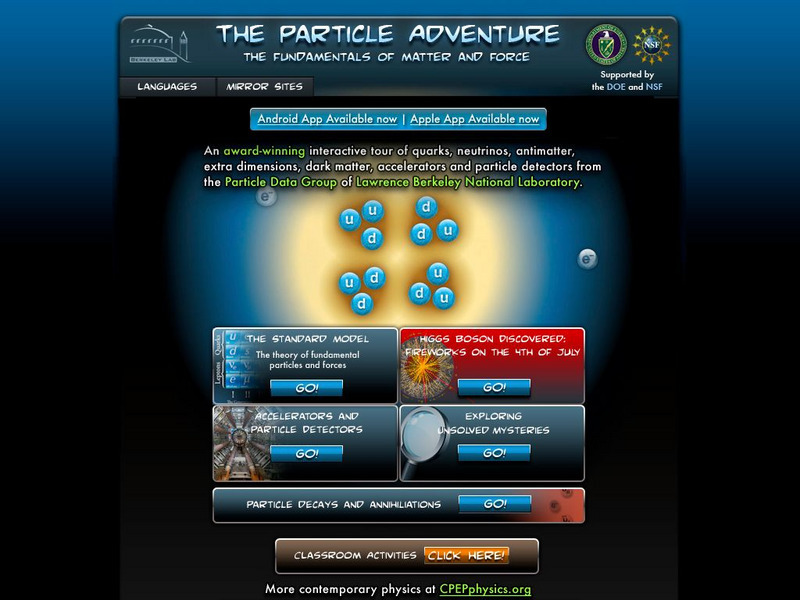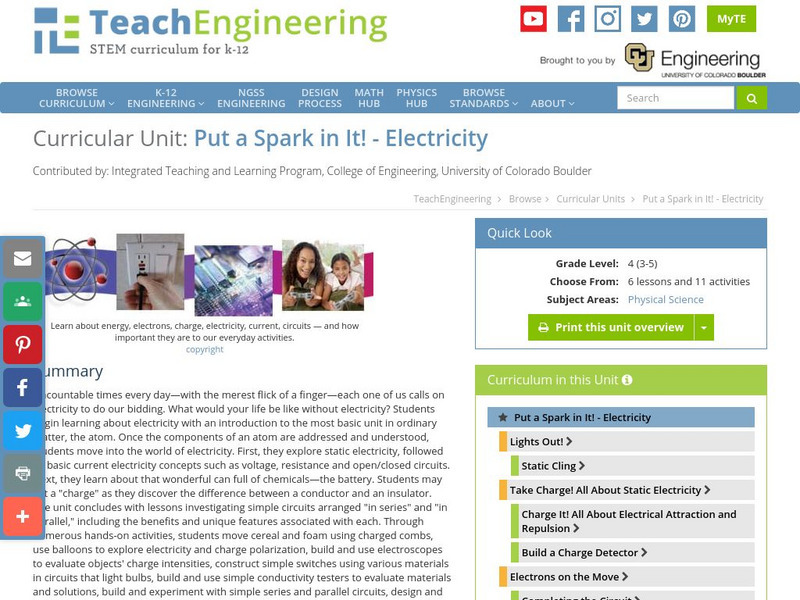Curated OER
Isotopes; Molecular Notation; Electron Orbits
In this isotopes, molecular notation, and electron orbits worksheet, students read selections pertaining to isotopes, mass number, molecular notation, electric attraction, and electron orbits. In addition, students complete 11 short...
Curated OER
Isotopes
In this isotopes worksheet, students review mass number, molecular notation, electron attraction, and electron orbits. This worksheet has 5 matching and 5 short answer questions.
Curated OER
Plate Tectonic - Volcanoes
Students watch and learn the different levels of "viscosity" in liquids to explain molten lava after viewing a video of a Hawaiian volcano.
Curated OER
Let the Sunshine in
Students collect and analyze data to study wavelengths of visible light. They cover Styrofoam cups with three different colors of sun filtering products and shine a lamp directly on the cups. They determine the most effective filtering...
Curated OER
Elements
For this elements worksheet, learners determine the atomic number, mass, number, electrons, protons, and neutrons for elements. Students review the electromagnetic spectrum. This worksheet has 1 graphic organizer and 13 multiple choice...
Curated OER
EGG-cellent POLYMER PACKAGING DESIGN
Learners investigate the concept of a polymer using an experimental design of protecting an egg in a bookbag. They test the properties of polymers and form an educated solution to the proposed problem. Then they describe the steps used...
Curated OER
Energy in the Home
In this energy use learning exercise, students read about kilowatts and solve 2 problems. They find the costs to run certain electrical items for a given amount of time and they determine the electricity consumption of an accelerator...
Curated OER
Density, Iron, and Anemia
Students explain what factors determine density. In this physics lesson, students hypothesize which objects are less dense. They cite the importance of density in everyday life.
Curated OER
Calculating the Average Mass of the Newly Discovered Element: Bean
Learners determine the average mass of a new element using masses from three isotopes. In this chemistry lesson, students explain what an isotope is. They discuss their importance and uses.
Sophia Learning
Sophia: Science Tutorial: Matter
Created to teach students of the 21st century, SOPHIA is bringing matter straight to your fingertips. Become the commander of your own learning experiences as you take part in this interactive tutorial. [1:02]
Khan Academy
Khan Academy: The Quantum Mechanical Model of the Atom
Introduction to the quantum mechanical model of the atom: Thinking about electrons as probabilistic matter waves using the de Broglie wavelength, the Schrodinger equation, and the Heisenberg uncertainty principle. Electron spin and the...
Lawrence Berkeley National Laboratory
Berkeley Lab: The Atom
Presented is an overview of atomic theory concentrating on the experiments of Ernest Rutherford.
Museum of Science
The Atoms Family
Let this classic family of monsters guide you as you learn about energy. Interactive exercises, experiments, and demonstrations help to build knowledge and raise questions.
Lawrence Berkeley National Laboratory
Berkeley Lab: The Particle Adventure
Visit this site for an interactive tour of the atom and all aspects of particle physics. View the animations available with almost every description on this site. A great place for the fundamentals of particles and forces including a...
Other
American Institute of Physics: Discovery of the Electron
Use this resource to read about the "Experiments by J.J. Thomson in 1897 [which] led to the discovery of a fundamental building block of matter." This exhibit is organized into several sections, including: "Mysterious Rays" and "1897...
University of Colorado
University of Colorado: Ph Et Interactive Simulations: Davisson Germer
Simulate the original experiment that proved that electrons can behave as waves. Watch electrons diffract off a crystal of atoms, interfering with themselves to create peaks and troughs of probability. Java required.
Bill Nye
Bill Nye: Hole Y Water
This tutorial from Bill Nye uses an experiment with water and sugar to show how matter is mostly empty space.
TeachEngineering
Teach Engineering: Put a Spark in It! Electricity
Uncountable times every day "with the merest flick of a finger"each one of us calls on electricity to do our bidding. What would your life be like without electricity? Students begin learning about electricity with an introduction to the...
National High Magnetic Field Laboratory
Magnet Academy: Joseph John Thomson
Joseph John Thomson, better known as J. J. Thomson, was a British physicist who first theorized and offered experimental evidence that the atom was a divisible entity rather than the basic unit of matter, as was widely believed at the...


















